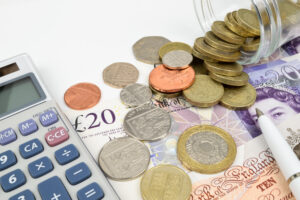
The rise of contactless card payments has brought the slow demise of old-fashioned notes and a pocket full of change, or so we thought. But it turns out cash is back as Britons try to manage tighter budgets in the cost of living crisis.
Cash payments rose for the first time in a decade last year, with the number of transactions increasing by 7 per cent to 6.4 billion, according to figures from UK Finance, the main financial services association.
Adrian Buckle, head of research at the group, said the rebound was thanks to the tougher economic environment. Rampant inflation and rising interest rates have piled pressure on household finances since the end of 2021.
“We do see that some people find it much easier to manage a limited budget if they have cash in front of them, something tangible that they can hold,” Buckle said, adding that a similar pattern happened after the 2007-09 financial crisis. “It is something we do tend to see in times of falling consumer confidence and economic uncertainty.”
The rapid rise of electronic and contactless payments has fuelled speculation that Britain is on course to become a cashless society. Since 2017, cash use has been falling by an average of about 15 per cent every year. This has raised fears that older people, who are more likely to use coins and notes, risk being left behind. Thousands of bank branches have closed in recent years.
Last month, the government set out a plan to safeguard access to cash, under which it said the “vast majority” of people and businesses would be no more than three miles from deposit and withdrawal services.
Natalie Ceeney, a campaigner on access to cash, said: “For all the talk of a cashless society, cash remains critically important for millions of people.”
Debit cards for half our purchases
Finance UK predicts that cash use will continue to dwindle in the coming years, however, and by 2032 will account for less than 7 per cent of all payments, down from 14 per cent last year. About four in ten people led almost entirely cashless lives last year.
At the same time, debit cards cemented their dominance and were used for about 23 billion payments, the first time they have accounted for half of all transactions in the UK.
The total number of all payments — including cash, debit, credit and charge cards, direct debits, cheques and mobile banking — climbed to 45.7 billion from 40.4 billion in 2021.
Buckle said that changes in consumer behaviour driven by cost-of-living pressures may have been a factor driving the overall growth. This is because rather than doing one big shop, the data showed consumers were instead doing a larger number of smaller purchases. This suggests consumers are shopping around more for bargains, Buckle said.
Post-pandemic working patterns also contributed. The rise of working from home has meant commuters are buying fewer season tickets in favour of purchasing individual tickets for each journey, pushing up the number of individual transactions.
Read more:
UK cash payments rise for the first time in a decade






